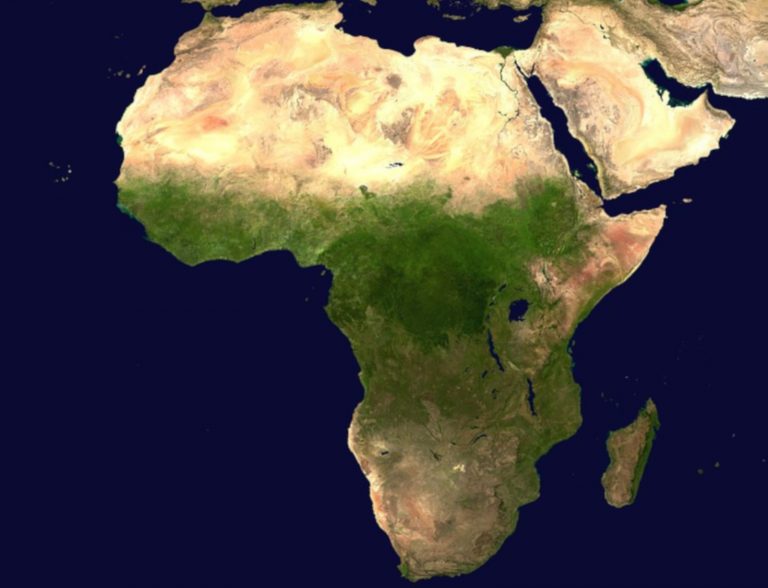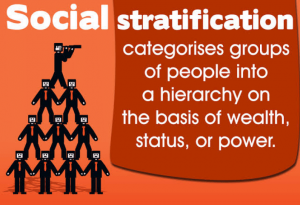The word “Africa” is emotive, conjuring up various pictures for distinct people. For others, it’s an ivory-tusked elephant standing before the snow-capped peaks of Mount Kilimanjaro; for others, it’s a dream glistening on the arid Sahara Desert. It’s also a strong term, evoking exploit and adventure, corruption and poverty, freedom and perplexity. For 1.2 billion people, the name “Africa” also means “home” – but where does it originate from? Nobody knows for sure, but in this article, we look at some of the most plausible theories.
Some think that the term “Africa” originated with the Romans, who called the region they discovered on the opposite side of the Mediterranean after a Berber tribe living in the Carthage area (now modern-day Tunisia). Afri is the most well-known form of the tribe’s name, according to several sources. The region is there to get the name Afri-terra by the Romans, which means “the country of the Afri.” As a result, this might have been condensed to make the single word “Africa.”
Alternatively, some historians believe that the suffix “-ica” might have been used to indicate “the country of the Afri”. This is similar to how Celtica (a region of modern-day France) was called after the Celtae or Celts who resided there. It is also suggested that the name was derived from a Roman misunderstanding of the Berbers’ own name for the region in which they lived.
If you want to know more about this topic, you’re welcome here. Read on as we explore all the facts about Africa.

Brief History of Africa
Africa is the location for human history’s lengthy beginning. This continent has been home to ape-like animals who walk erect on two feet since around four million years ago. They were dubbed Australopithecus because they were intermediate between apes and humans. Later, about two million years ago, the first animals classified as belonging to the human species emerged in Africa. They established a technology based on sharp flint tools, ushering in what became known as the Stone Age.
Humans in Africa generate some of the oldest and most notable examples of ancient art during the last portion of the old Stone Age. Paintings on stone slabs discovered in Namibia stretch back almost 30,000 years. Rock and cave paintings have been found in vastly disparate locations. They vary from the San people of southern Africa to those going back to around 8000 BC in what is now the Sahara.
Africa’s first civilizations: from 3000 BC
Egypt’s natural connections are northeasterly, following the Fertile Crescent up into western Asia. Similarly, Arabia, just over the Red Sea, impacted Ethiopia, the other early civilization of northeast Africa. As a result, Egypt and Ethiopia, bordered by desert to the west. The equatorial jungle to the south, evolved separately from the rest of Africa at first.
However, the growth of maritime commerce along the Mediterranean coast. The Phoenicians pioneered this in the 8th century BC, increasingly places Egypt in a North African setting.
The people of sub-Saharan Africa: 2000 – 500 BC
Khoisan tribes occupy a large portion of the African continent’s southern hemisphere. This is distinguished by a language having a distinct click in its repertoire of sounds. The Khoisan are divided into two groups: the San (formerly known as Bushmen) and the Khoikhoi (similarly known until recently as Hottentots).
The Pygmies are the people with a height of around 4’9′ or less than 1.5m) live mainly in the tropical woods of central Africa. However, the Africans who would eventually rule much of Sub-Saharan Africa are Bantu-speaking tribes from the north. The Bantu languages are said to have originated in the area of contemporary Nigeria and Cameroon. The Bantu languages are said to have originated in the area of modern Nigeria and Cameroon. This western region, which borders the Gulf of Guinea, is also the birthplace of other early African innovations.
Tribes speaking Bantu languages began to migrate south during the first millennium BC. They eventually pushed the Khoisan ahead of them. This is part of a trend that will ultimately see the Bantu take control of virtually the whole southern half of the continent.

Islam in East Africa: 8th – 11th century
Africa is the first place where Islam is brought in by merchants rather than troops. It expands down the east coast’s well-established trade lines, with the Red Sea’s coastal towns (the very core of Islam) playing a significant role.
There is archaeological evidence of a modest wooden mosque with enough for approximately ten worshipers as far south as contemporary Kenya – on Shanga, one of the islands offshore from Lamu – dating from the 8th century. Surviving shards of Persian pottery and Chinese stoneware attest to Shanga’s international connections at the period. By the 11th century, when Islam made its most significant inroads in Africa, they had established many colonies to the east.
At this time, a full-fledged Muslim dynasty is formed at Kilwa, on the coast of current Tanzania. Coins dating from around 1070 refer to the local monarch as ‘the magnificent Sultan Ali bin al-Hasan.’ Three centuries later, Muslim explorer Ibn Batuta discovers Kilwa to be an enormously wealthy sultanate, bustling with gold and slave trafficking. In most parts of the East African coast in the twentieth century, Muslims were either a majority or a significant minority. However, early Islamic infiltration is considerably more effective along west African caravan routes.
Islam in West Africa: 8th – 11th century
Islam steadily expands south through the oasis of the Sahara trade routes beginning in the eighth century. Many of the merchants at the southern end of the trade routes became Muslims by the 10th century. The rulers also began conversion in the 11th century.
The monarch of Gao, who reigned about the year 1000, was the region’s first Muslim ruler. Other communities’ governing elites follow suit. Ghana’s ruler, the most powerful realm, is one of the last to adopt Islam, most likely in the 1070s. The impact of Islam on African tribes, who have rich indigenous traditions of their own, is a slow process. Ibn Batuta visits Mali in 1352. He is amazed at the people’s consistency in praying.
The forest kingdoms of west Africa: 11th – 15th c.
In the 15th century, Iife was overshadowing for a neighbouring country. It’s Benin, which is to the southeast and farther into the forest. A warrior monarch, Ewuare, establishes rule from Benin city over a seventy-five-mile-long woodland area. When the Portuguese arrived in Benin in 1486, they were immensely happy with several aspects of the country. They were really happy for the luxury of life in the royal palace. They respect the administration’s efficiency.
Outsiders around Africa: 16th century
From the 16th century, the tale of Africa is one of the strangers prowling along its coastlines in quest of loot or commerce.
The two most powerful Mediterranean states focus their attention on the north. The so-called Barbary coast, which stretches from Algeria to contemporary Libya, gets attention of the Spanish and the Turks. And the Turks won. The Portuguese are the forerunners of European interest in the remainder of Africa, from Morocco to the Cape and then along the east coast.
Their interest on the west coast is in the slave trade, which has resulted in Portuguese colonies in both Guinea and Angola. People lured them to Mozambique and the Zambezi River from the east coast by rumours of a local monarch, the Munhumutapa, who has a gold fortune.
The Munhumutapa and his gold mines are still beyond of reach of the intruders. However, in this part of East Africa, like in Guinea and Angola in the west. Portuguese influence became strong enough to last into the twentieth century.
Dutch and British trade in Africa: 17th-18th century
East India businesses’ economic interests are concentrating on the spice islands of the East Indies. Africa is nothing more than a vast object to sail itself around. Sailing ships, on the other hand, require safe ports where they may load water as well as fresh meat and vegetables.
In each of these endeavours, Europeans only establish touch with Africa’s coastal areas. The nineteenth-century saw a surge in curiosity in the interior of this last undiscovered continent.

African Slavery
- Europeans were preparing to transfer African slaves across the Atlantic in the 16th century. Slavery, on the other hand, was a relatively new extinction in Africa. For generations, Africans sold different Africans as slaves to the Arabs. However, the trans-Atlantic slave trade grew to be massive.
- Ships from Britain sent manufactured products to Africa in the 18th century. They transported slaves to the West Indies and sugar back to Britain. This was popular as the Triangular Trade. (Many other European countries participated in the slave trade as well.) Some Africans were there because they had committed a crime.
- Many slaves, however, captured themselves in raids by other Africans. Europeans also could not travel inland in search of slaves. Instead, Africans transported slaves to the seaside. Slaves who were not auctioned off were either murdered or sold as slaves to other Africans.
- Without the cooperation of Africans, many of whom grew up rich on the slave trade, the slave trade would have been unreachable. Meanwhile, from the 16th through the 18th century, North African Barbary pirates stole Spanish and Portuguese ships.
- In the 16th century, a group of people declared that the Turks had conquered the majority of the North African coast. They conquered Egypt in 1517, and by 1556, they controlled the majority of the coastline. South Africans went on to establish strong kingdoms.
- Kanem-dominion Bornu’s grew in the 16th century, thanks to firearms bought from the Turks. Despite its survival, Ethiopia lost strength and prominence in the 16th century.
Europe invasion Of Africa
- In the meantime, Europeans built their first colonies in Africa. The Portuguese established colonies in Angola and Mozambique in the 16th century, while the Dutch established a settlement in South Africa in 1652.
- During the nineteenth century, European countries tried to put an end to the slave trade. In 1807, Britain outlawed the slave trade. On the other hand, in the late nineteenth century, Europeans conquered the majority of Africa! The British took over the Dutch colony in South Africa in 1814. The French attacked northern Algeria in 1830.
- In 1896, the French conquered Madagascar. In addition, they expanded their kingdom in northern Africa. They conquered Morocco in 1912, while Italy conquered Libya.
- Egypt won itself over by the British in 1914. Except for Liberia and Ethiopia, all of Africa was under European control at the time. The Italians ruled Ethiopia in 1896 but the Ethiopians disposed them.
- The British gained Zimbabwe, Zambia, Malawi, Uganda, and Kenya farther south. The British also took over this country. Portuguese loomed over Angola and Mozambique. However, in the early twentieth century, Europe’s attitude toward imperialism began to shift. Furthermore, churches in Africa established schools, and a growing number of Africans got education.
Facts About Africa
Therefore, we present you the frequently asked questions about Africa and its history.
Africa Foundation
The African continent have five old Precambrian cratons: the Kaapvaal, Zimbabwe, Tanzania, Congo, and West Africa. These evolved between 3.6 and 2 billion years ago. Since then, they have remained tectonically stable. Those cratons surrounded themselves with fold belts that are younger.
Who first settled in Africa
The Portuguese were the first Europeans to set foot in Southern Africa. They made their way along Africa’s coast, hoping to outflank Islam. As a result, a maritime path to India’s wealth discovered itself, as well as new food supplies.
Africa’s previous name
According to specialists who study the history of the African continent, Africa’s original ancient name was Alkebulan. This name means “mother of mankind” or “Garden of Eden.” Alkebulan is an exceedingly ancient term with indigenous origins.
Africa in Bible
The entire territory that contains what the Bible refers to as the Land of Canaan. Palestine and Israel were extensions of the African continent. It then separated itself from the main African continent by the man-made Suez Canal.



